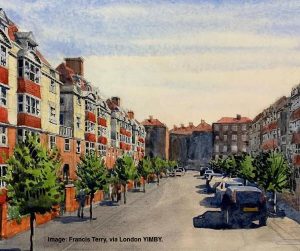Chelgate Local Newsletter – March 2020

The impact of the Coronavirus on planning process, housing pledges in spring 2020 budget, Sevenoaks local plan is dead, should beauty be at the centre of our planning system and how the Environment Bill is likely to impact the planning system.
Housing Pledges in 2020 Spring Budget (The impact of the Coronavirus on planning process)
By Kasia Banas, Account Director
With the budget focused on the response to the Coronavirus crisis, the Chancellor Rishi Sunak did not have much space left for housing announcements, something the industry has got used to over the years.
The key pledges consist of a £12bn extension of the Affordable Homes Programme, a £1bn Building Safety Fund to remove unsafe cladding from buildings and £650m of funding to help rough sleepers into permanent accommodation. A total of £1.1bn of new allocations through the Housing Infrastructure Fund have been confirmed, to open up 70,000 homes in areas of high demand across country. There will also be a new £400m fund for regions to build on brownfield sites. Interest rates for loans from the Public Works Loan Board, which are used by councils for housebuilding, will be cut by 1%, making £1bn available.
The initial response from the sector has been mildly positive. Voices from the Chartered Institute of Housing, National Housing Federation or Shelter have all welcomed the announcements but stressed that this only the beginning and much remains to be addressed. They also pointed out that the devil is often in the detail and the real impact of these pledges will not be known until they’re put into practice.
have all welcomed the announcements but stressed that this only the beginning and much remains to be addressed. They also pointed out that the devil is often in the detail and the real impact of these pledges will not be known until they’re put into practice.
The Chancellor also announced reforms to the planning system, which were presented the following day by the Housing Secretary Robert Jenrick. In his statement to the Commons, Jenrick set out his vision for getting the country to build more homes more quickly, and which fit into local design standards. The announcement coincided with the publishing of the Planning for the Future document, setting out the new policies.
New permitted development rights for building upwards on existing buildings will be introduced by Summer 2020 and consultation on extending them to allowing vacant buildings to be demolished and replaced with new homes is to take place. Mr Jenrick pledged to support community and self-build housing schemes as well as the use of compulsory purchase orders by local authorities. In efforts to support the Oxford-Cambridge arc, he is setting up a new spatial framework for the area and forming four development corporations across the area.
To incentivise more building urban areas, there will be yet another review of the method for calculating local housing need. Local authorities were also given a deadline of 2023 for having an adopted local plan or they will face intervention, something that Mr Jenrick has already done in South Oxfordshire. Pass rate for the Housing Delivery Test will be raised to 75% in November 2020 and local authorities that build more homes will have access to greater funding from the New Homes Bonus.
There will also be a revision to the National Planning Policy Framework (NPPF) with a stress on good design and placemaking throughout the planning process. In response to the Building Better, Building Beautiful Commission’s report, the calls for urban tree-planting and community-led design will receive his backing through implementation of a new National Design Code.
We can expect further details in the white paper, expected later in the Spring. Whilst many will say that these announcements are not taking the reforms far enough, the government is in a tough spot of trying to incentivise more building whilst facing the climate emergency. As in the case of Heathrow’s third runway, many housing and infrastructure project will undoubtedly see a lot of pushback from the increasingly environmentally aware public. The goal of introducing the 80% lower carbon emissions target for new homes will be the first one to be criticized for lack of ambition.
Sevenoaks Local Plan is Dead
by Michael Hardware, Director of Planning and Property
The council has received further bad news – not only has the Sevenoaks Council failed in its duty to cooperate, the inspector also has serious concerns over the overall soundness of the local plan. Is the plan dead?
The inspector, Karen Baker, submitted the final report to Sevenoaks council earlier this month revealing several areas of concern, areas where she would have wanted further evidence had the examination in public progressed.
 This was on top of her ruling that the council had failed in its duty to cooperate with its neighbours. The council hotly disputes this, and it does not appear any of the adjoining authorities have been complaining too much about the lack of cooperation – possibly because such cooperation may have resulted in them having to take some of Sevenoak’s numbers.
This was on top of her ruling that the council had failed in its duty to cooperate with its neighbours. The council hotly disputes this, and it does not appear any of the adjoining authorities have been complaining too much about the lack of cooperation – possibly because such cooperation may have resulted in them having to take some of Sevenoak’s numbers.
The inspector outlined several broad areas of concern, most of which were known about. These included the sustainability appraisal, green belt assessment, the approach to the definition of exceptional circumstances, justification of the housing requirement being significantly lower than the housing need, the deliverability or develop ability of some allocations and the simplistic phasing.
The council now has a decision to make: whether to accept the inspector’s views and withdraw the plan, or to mount a challenge through the courts. Statements made by the Secretary of State last week about local authorities having up-to-date local plans and delivering housing need may well sway the council’s decision.
In light of this and the inspector’s comments, it is reasonable to expect the council will accept that the plan is dead and withdraw it. This will have implications for neighbouring authorities as future discussions with Sevenoaks, in order to fulfill the duty to cooperate, may well result in them having to take additional numbers. In any case, Sevenoaks will have some work to do if they are going to meet the new 2023 deadline.
Should Beauty be at the Centre of our Planning System?
By Ruby Burdett, Consultant
The late Roger Scruton alongside co-author Nicholas Boys Smith, coined the idea of “building better, building beautiful” (BBBB). The now government endorsed report, has been labelled a radical amalgamation of politics and philosophy. Arguing that beauty is not subjective, Scruton asserts that we are obligated to safeguard and encourage public beauty.
The report heavily criticises David Cameron’s 2012 planning regime for being geared towards ugliness. According to the BBBB, the planning system is solely driven by mass development, maximum profit and innovation, while the beauty factor is paled into insignificance. Considering this, a suggestion that is emphasised heavily by the report is to encourage the government to dismiss ugly developments.
In light of Jack Airey’s recent appointment to No.10 as special planning advisor, this lack of focus on beauty is likely to alter. Considering that prior to his appointment, Airey’s research focussed much on raising housebuilding beauty standards, it is likely that the planning system will soon see significant changes.
his appointment, Airey’s research focussed much on raising housebuilding beauty standards, it is likely that the planning system will soon see significant changes.
While the likelihood of change to the planning system seems almost certain, it is up for debate whether beauty should be at the focal point. One question that comes into play is whether the government are qualified to define beauty on behalf of the country. Scruton’s notion that beauty is objective faces inevitable opposition from many who hold the view that beauty is in fact dependent on individual perception. If one man’s treasure can be another man’s garbage, there is a risk of the government becoming a judge on what is beauty.
The report has raised the eyebrows of those who don’t value aesthetic when it is pitted against other issues within the planning system. During a time where the gap between the current housing supply and the amount needed for everyone to have a decent home is more than one million, doesn’t quantity and affordability trump beauty? The BBBB insists it is not anti-development but that it is simply advocating for beauty to play a part in the planning system. However, if planning consent can be refused based on ugliness as the report suggests, reaching housing targets will inevitably be hindered.
Amongst the radical call to urge the government to reject ugly developments, are milder and arguably useful suggestions. The report suggests planting two million trees on streets, in order to make new housing developments more attractive, thereby passing planning more easily. The BBBB further urges to developers to plant a fruit tree for every house they develop, to improve public well-being. While these reforms may not solve the housing crisis, they will make areas more liveable.
Perhaps a space should be established for beauty within the planning system, but it doesn’t seem feasible for it to be at the centre, and to the detriment of development.
How the Environment Bill is Likely to Impact the Planning System
By Alia Khan, Consultant
The Government first introduced the new Environment Bill in October 2019, with an updated version of the Bill being introduced on 30 January after the first one was side-lined by the December 2019 general election. The Environment Bill comes at a time when there is heightened interest in the overall environmental agenda, and with more councils declaring climate emergencies, it will be interesting to see what changes it brings to the planning system in the UK.
The bill has set out four key changes in planning; first, a new duty for developers to deliver 10% net biodiversity gain in new schemes; second, the availability of biodiversity credit for developers, should they fail to deliver the required on-site biodiversity improvement; third, councils will also have to produce a spatial “local nature recovery strategy” for better spatial planning for nature recovery; and finally the bill will also establish a new public body called the Office for Environment Protection (OEP), which will regulate the UK’s environment after the European Commission ceases to have jurisdiction.
 The changes are likely to impact planning applications in the foreseeable future, as developers will have to submit ‘biodiversity gain plans’ alongside planning applications, meaning not only will developers have to adhere to additional application costs, it means that when applications do reach committee stage, they will face more objections and challenges from local politicians, if they feel that the overall application does not adhere to contributing to enhancing and improving the environment.
The changes are likely to impact planning applications in the foreseeable future, as developers will have to submit ‘biodiversity gain plans’ alongside planning applications, meaning not only will developers have to adhere to additional application costs, it means that when applications do reach committee stage, they will face more objections and challenges from local politicians, if they feel that the overall application does not adhere to contributing to enhancing and improving the environment.
The 2019 local elections, however, saw a rise in the number of Green and Liberal Democrat councillors being elected, further demonstration general environmental concern. This is a key reason why many councils have been promoting the environmental agenda and declaring climate emergencies. This is likely to result in a decrease in the number of planning applications going through, especially those which promote land and development on the greenbelt.
A huge example where the environment is impacting upon planning decisions is the third runway at Heathrow. It was ruled illegal by the court of appeal. The ruling laid out that ministers did not adequately take into account the government’s commitment to tackle the climate crisis. This is likely to encourage local councils and politicians to do the same and effectively scrap any planning applications which will be deemed as damaging to the environment, especially ones which will fail to deliver 10% biodiversity net gains.
This will all have impacts both at officer and member level going forward. The introduction of the Environment Bill and rising interest in the environmental agenda will affect decision making. Local politicians, planners and developers will all be facing challenges and objections from the public. It will not, however, be an impossible task; just issues which that planners and developers will need to be more aware of and consider when submitting applications
If you have concerns about how councillors’ concerns about climate change could impact your planning application, please give Chelgate Local a call on 020 7939 7939 or email planning@chelgate.com
The impact of the Coronavirus on planning process – will planning stop and development be delayed?
by Michael Hardware, Director of Planning and Property
The Government is escalating its response to the Coronavirus pandemic, encouraging a comprehensive voluntary lockdown. It has just closed all the schools and is running down the transport infrastructure. The development industry has been affected with many developers and consultants now working from home, and local councils in the process of deciding what they are going to do. But does this mean planning will stop and all development delayed?
There are three parts to the answer: the developers and promoters, the planning officers and the political decision makers.
Developers, promoters and their consultants are mainly working from home and appear adamant that their roles can continue and timetables for  development will be unaffected. Many of our projects are continuing to existing programmes, perhaps even with greater zeal.
development will be unaffected. Many of our projects are continuing to existing programmes, perhaps even with greater zeal.
Many council planning officers are also now working form home and see little reason why their processes and responsibilities cannot continue as before. The only reservation could be access to records and files. Those accompanying planning applications tend to be large and difficult to download, view and manage at home, but technology does have solutions even here.
With the average age of councillors in 2018 being 59 years, with 43 per cent being aged 65 or over, quite a large proportion are now isolated. Generally, almost all council meetings have been cancelled, most up until annual meetings in May at the earliest. Most council facilities have also closed, with the focus online and with telephone contact centres to maintain services.
The one exception is planning, which has a legal role. Unfortunately, the law does not provide for virtual meetings – a quorum has to be made up of members physically present. Councils are opting for planning committee meetings to take place with just the quorum present, and usually of younger less-vulnerable members, together with a minimum number of officers.
If planning decisions are still going to be made, what about the planning process?
Consultation involving exhibitions and face-to-face engagement are not going to happen –consultants will, instead, have to rely on alternative channels of engagement to encourage residents to participate in consultations.
This potentially offers a real opportunity for greater involvement, and not just during the current crisis. A combination of enhanced direct mail and online tools will have to be deployed to reach residents and encourage them to give their views. The form of the consultation itself will also have to change. New online mediums will need to be deployed to ensure residents find and view the information they need to be able to give views. This could also include live webinars with consultants and interactive tools to enable residents to question them in real time.
How long is this all going to go on for? No one can answer that question but likely to be at least until the end of April or into May. The return to normality will be a gradual process as there will need to be an element of confidence-building before people feel safe to go back to their normal routines.
It may be that things will never be the same with the digital and enhanced online consultations continuing alongside the traditional exhibitions and face-to-face engagement resulting in a boost to consultation involvement.
Contact Us
If you would like to know more information about the impact of the Coronavirus on planning process or any of the above content please contact Chelgate Local or speak to Michael Hardware or Liam Herbert
